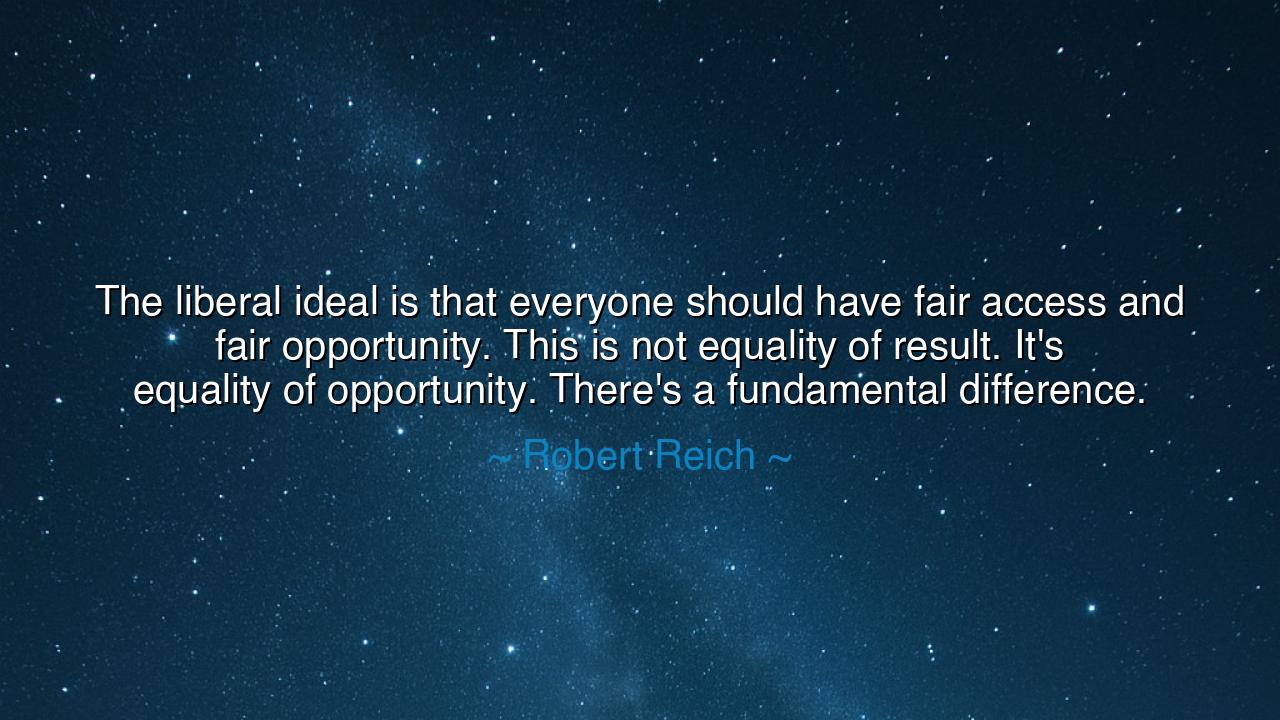
The liberal ideal is that everyone should have fair access and
The liberal ideal is that everyone should have fair access and fair opportunity. This is not equality of result. It's equality of opportunity. There's a fundamental difference.






Robert Reich, with the voice of one who has studied the struggles of nations, declared: “The liberal ideal is that everyone should have fair access and fair opportunity. This is not equality of result. It’s equality of opportunity. There’s a fundamental difference.” These words shine like a torch in the midst of confusion, for they remind us that justice is not the guarantee of identical outcomes, but the assurance of a level beginning. His teaching draws a line between fairness and uniformity, between freedom guided by opportunity and tyranny disguised as equality.
When Reich speaks of equality of opportunity, he calls forth an ideal as old as the dream of democracy itself: that every child, regardless of birth or station, should have the chance to rise according to their gifts. This vision does not promise that all will end at the same place, for talents differ, choices differ, fortunes differ. But it does promise that the race of life begins on ground that is fair. By contrast, equality of result seeks to make outcomes identical, regardless of effort or circumstance. Reich warns that this path, though perhaps born of compassion, becomes destructive, for it denies the dignity of human striving and the natural diversity of gifts.
History gives us a powerful example. In the aftermath of the French Revolution, radicals sought to create equality not only of opportunity, but of result. Property was seized, privileges stripped, and society forced into sameness. Yet the outcome was not justice but terror, as the guillotine fell upon thousands, and liberty was consumed in the fire of enforced uniformity. By contrast, the American vision—though imperfect and incomplete—was rooted in the belief that all should have the chance to pursue happiness, even if the outcomes of that pursuit would differ. Reich’s words echo this ancient truth: opportunity is the soil of freedom, but imposed results are its death.
Yet to speak of fair access is also to recognize that opportunity must be real, not illusion. A child born in poverty, denied schooling or health, does not truly begin the race on equal footing with the wealthy. To preach opportunity while denying the conditions that make it possible is hypocrisy. Thus, Reich’s ideal demands more than rhetoric—it demands schools that welcome all, systems that guard against discrimination, and societies that clear away the stumbling blocks of prejudice and poverty. Opportunity without access is a shadow, but opportunity with fairness becomes a flame.
The origin of Reich’s conviction lies in his lifelong study of economies and societies. As Secretary of Labor in the United States, he saw firsthand how wealth could concentrate, leaving vast numbers locked out of opportunity. He understood that justice must aim not to equalize every paycheck, but to ensure that no one is barred from the chance to earn one. His words are therefore not theory alone, but the wisdom of experience, forged in the furnace of policy and history.
The deeper meaning is this: liberty and equality are not enemies but companions, if rightly understood. Liberty without equality of opportunity becomes privilege, where only the powerful can climb. Equality of result without liberty becomes tyranny, where the spirit of human endeavor is crushed. But when equality of opportunity is secured, liberty flourishes, for every soul is free to rise, to fall, to learn, to try again, and to find dignity in the journey itself.
The lesson for us is clear: do not demand sameness of outcome, but demand fairness of beginning. Fight for schools that are open to all, for healthcare that allows children to grow strong, for workplaces free of bias. Encourage the strong to use their gifts, but do not leave the weak abandoned at the starting line. This is the true liberal ideal—a society where all may run the race of life, some faster, some slower, but none barred from the course.
Thus, Robert Reich’s words stand as a teaching for generations: “It’s not equality of result. It’s equality of opportunity.” Let us carry this wisdom forward, that we may guard liberty without abandoning fairness, and embrace equality without extinguishing freedom. For in this balance lies the true strength of nations, and the only path by which justice may endure.






AAdministratorAdministrator
Welcome, honored guests. Please leave a comment, we will respond soon